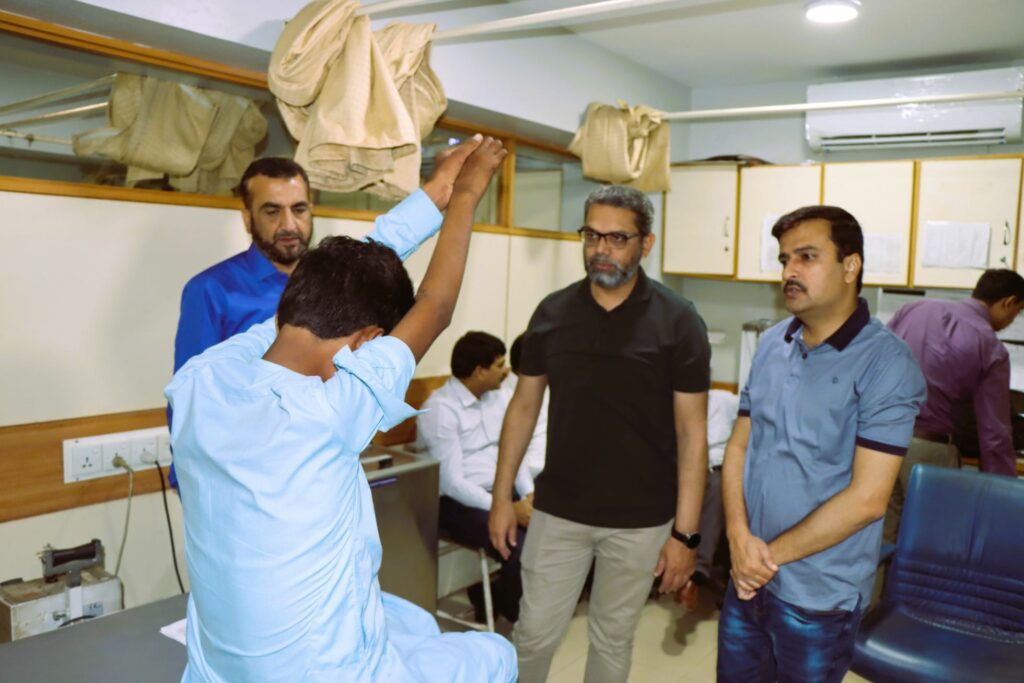
By Assad Abbas Malik for ReLAB-HS
The growing need for rehabilitation and assistive technology (AT) services in Pakistan, fueled by factors such as an aging population, increased incidence of noncommunicable diseases, and road traffic injuries, is largely unmet due to limited availability and access to these services. This leaves a significant portion of the population without even basic rehabilitation and AT support.
To improve community access to rehabilitation and AT services, Learning, Acting, and Building for Rehabilitation in Health Systems (ReLAB-HS) collaborated with the World Health Organization (WHO) to train medical doctors to deliver basic rehabilitation services at primary care facilities in the districts of Swat and Thatta. The training was conducted using the Basic Rehabilitation Package – Clinical Resource (BRP-CR), a newly developed WHO resource. The BRP-CR is designed to guide the clinical decision-making of primary care providers, enabling them to identify rehabilitation needs and provide basic rehabilitation, such as easy-to-follow, simple exercises to improve mobility.
ReLAB-HS engaged rehabilitation professionals in the workshop to mentor the trainees and provide supervision. The mentors supported the facilitators by providing practical demonstrations, which included conducting patient assessments, developing the appropriate treatment plan using the BRP-CR as a guide, and teaching exercises to patients. During visits to rehabilitation facilities for practical training, mentors guided trainees in working directly with patients, giving them an opportunity to apply what they learned in a realistic setting. This engagement demonstrated feasible and effective collaboration between primary care providers and rehabilitation professionals. Building this interprofessional connection promotes continuous mentorship that will strengthen the coordination and quality of rehabilitation services and improve the referral procedures between primary care and rehabilitation facilities.
Feedback from participants highlighted the usefulness of the training in enhancing their knowledge and skills, acknowledging how comprehensive it was and emphasizing its potential to improve patient care. Dr. Imran Khan, a medical doctor from a primary care facility in Swat, recognized the value the training would add in bringing services closer to communities. “As a result of this training, patients won’t have to endure the inconvenience of traveling to distant hospitals for basic rehabilitation as we have received very in-depth knowledge on basic rehabilitation,” he shared.
A medical doctor from a primary care facility in Swat appreciated that the practical sessions at the Saidu Group of Teaching Hospitals bridged the gap between theoretical knowledge and the actual treatment provided to patients.
The mentors also saw great benefit to this training. They recognized the added value of expanding the skills of primary care providers to deliver basic rehabilitation services and the vital link it establishes between primary care providers and rehabilitation professionals.
The district health officers of Swat and Thatta attended part of the training, underscoring the commitment of district stakeholders to integrate rehabilitation and AT services into primary care. Dr. Salim Khan, District Health Officer of Swat, acknowledged the challenges posed by limited resources and affirmed the district’s commitment to improve rehabilitation services.
![]() The collaborative implementation of BRP-CR demonstrates a concerted effort to address the rehabilitation needs of the population in Pakistan. This training expanded the skill sets of medical doctors to assess for rehabilitation need and deliver basic rehabilitation services in primary care facilities at the district level in Pakistan, a critical step in working toward improving the availability of and access to rehabilitation services closer to where people live. Additionally, it strengthened relationship building between the providers and mentors—an essential element to strengthening and integrating quality rehabilitation services within the current health systems.
The collaborative implementation of BRP-CR demonstrates a concerted effort to address the rehabilitation needs of the population in Pakistan. This training expanded the skill sets of medical doctors to assess for rehabilitation need and deliver basic rehabilitation services in primary care facilities at the district level in Pakistan, a critical step in working toward improving the availability of and access to rehabilitation services closer to where people live. Additionally, it strengthened relationship building between the providers and mentors—an essential element to strengthening and integrating quality rehabilitation services within the current health systems.